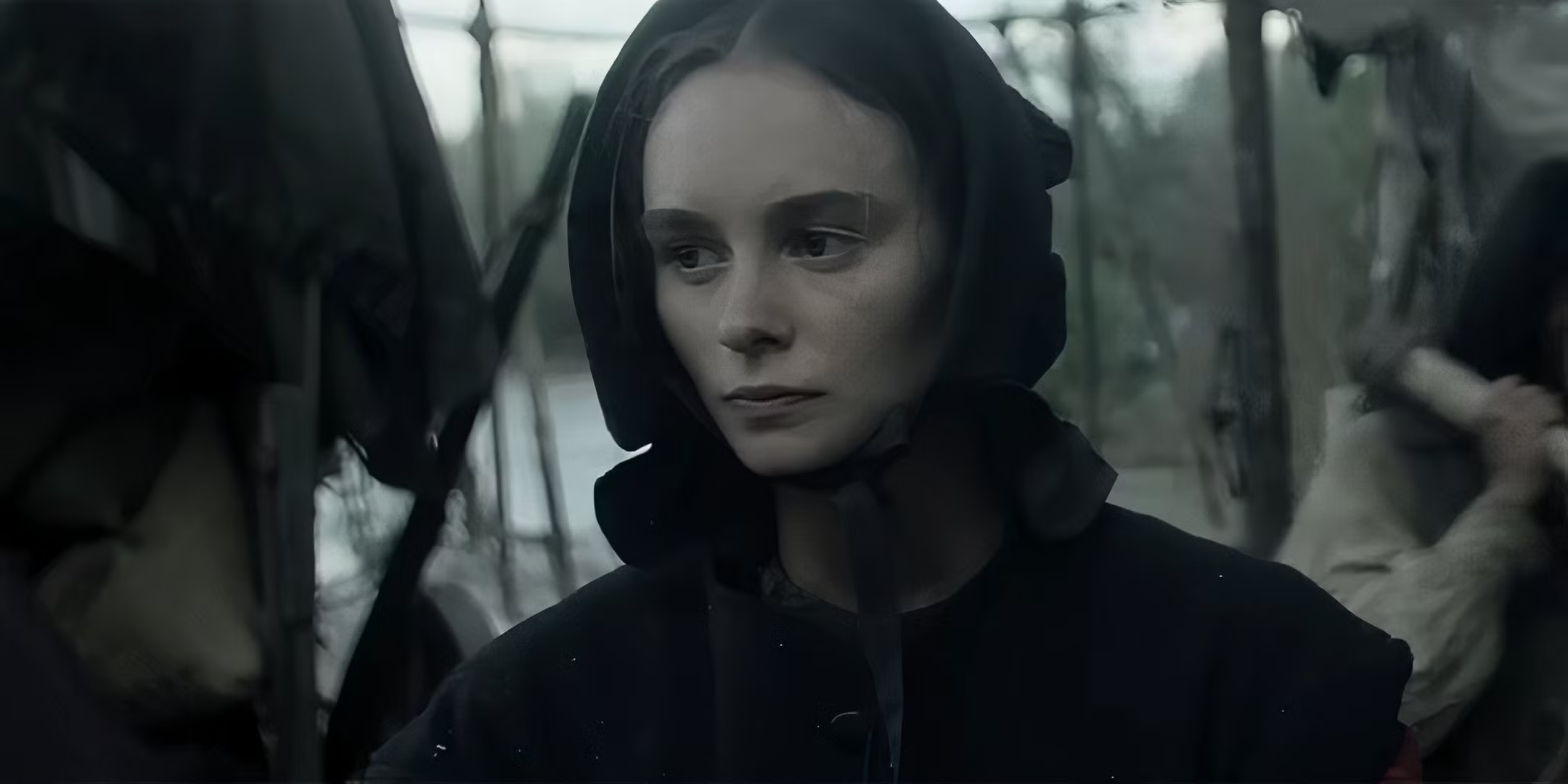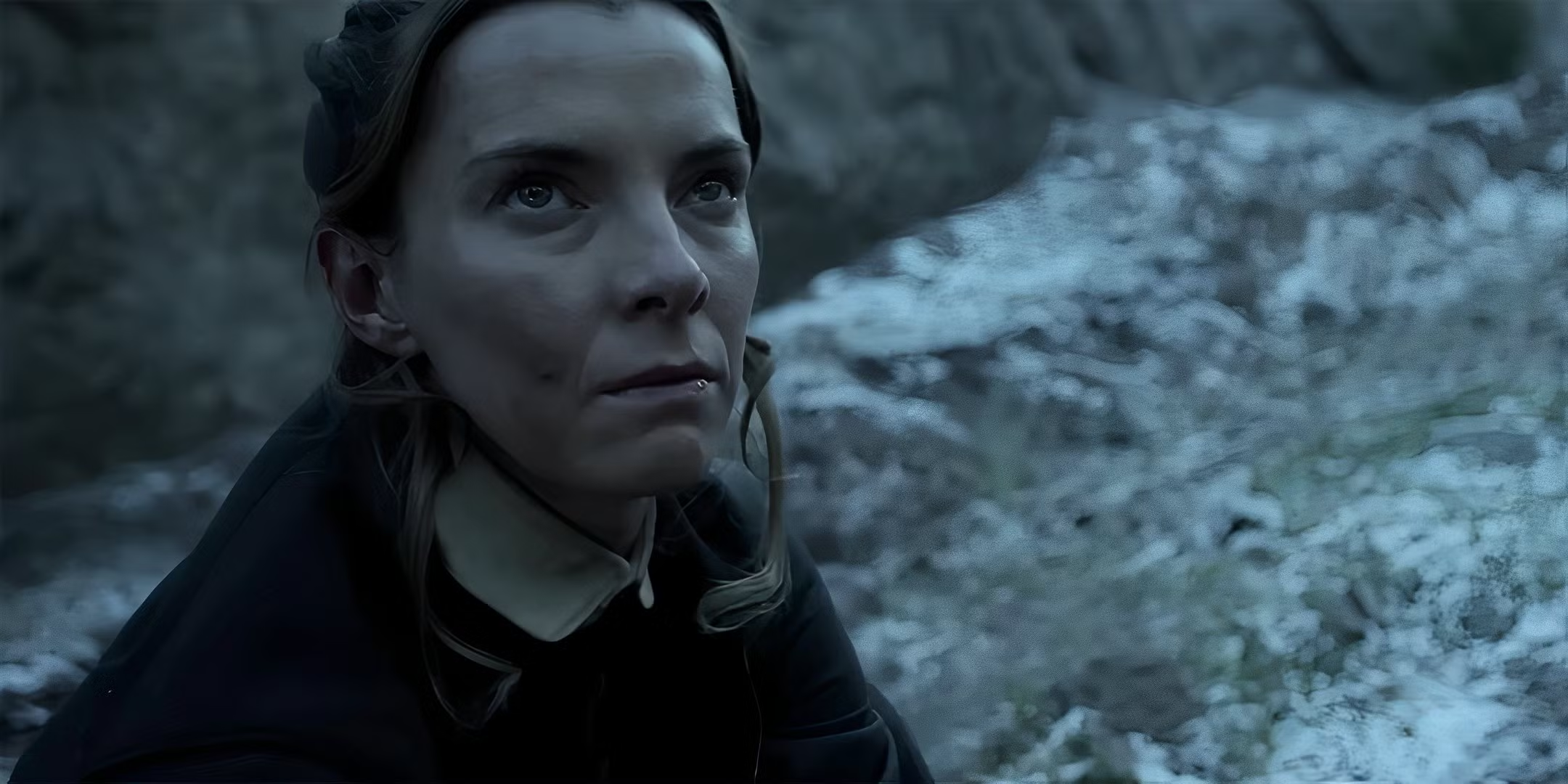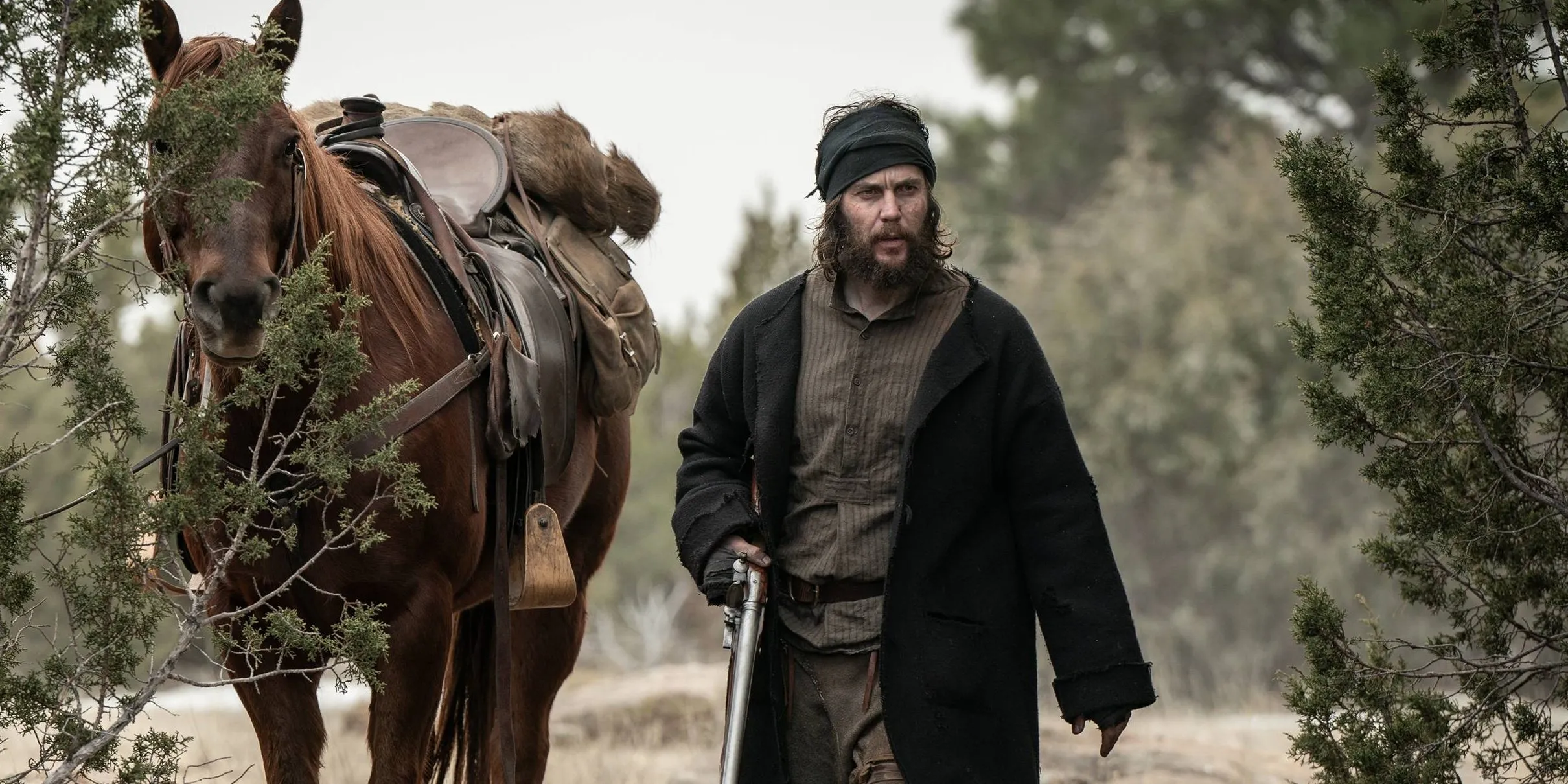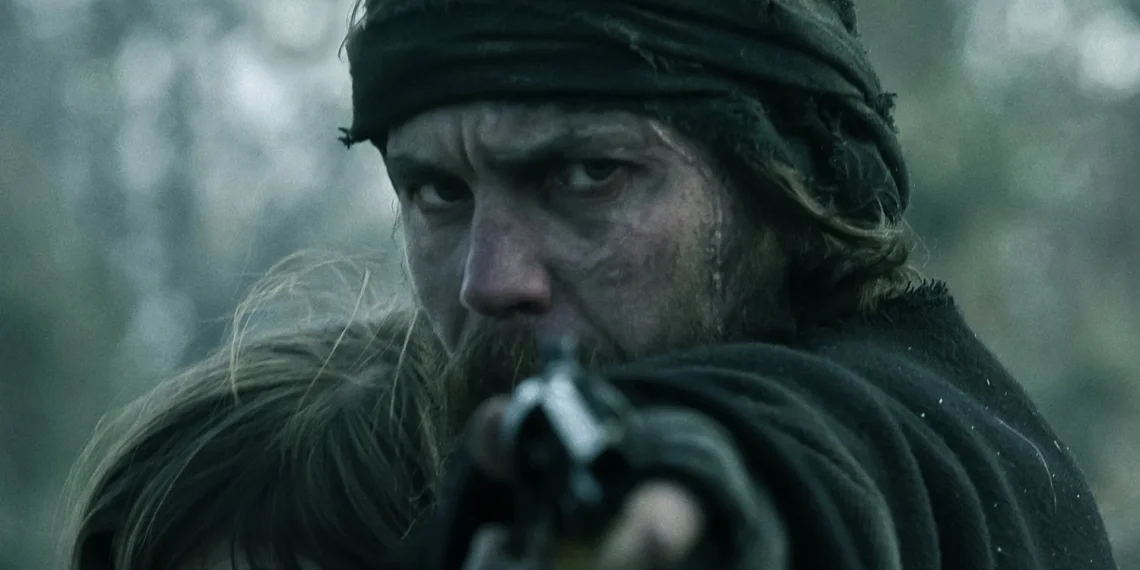Netflix’s American Primeval, a compelling period Western series, concludes with a twist that leads the central characters to California. Set in 1857 amidst the harsh, lawless terrain of Utah, the show immerses viewers in the brutal lives of early settlers, Indigenous tribes, and the survivors of endless violent struggles over control of the land. The finale takes a surprising turn, altering the characters’ paths dramatically.
The series, which premiered on January 9, 2025, focuses on the violent and unforgiving world of early America, where settlers, cultists, and indigenous people navigate a harsh frontier. Written by Mark L. Smith, who co-wrote The Revenant screenplay, the show shares thematic and stylistic similarities with the latter, particularly in terms of its raw narrative and visual storytelling. Directed by Peter Berg, the show features an ensemble cast led by Taylor Kitsch, who portrays Isaac Reed, a man haunted by his past, and his eventual tragic demise.
By the end of the series, Isaac has completed his journey, fulfilling his personal mission of dying heroically to join his deceased family in the afterlife. His death is an emotional moment in a show that has continuously showcased the sacrifices and personal journeys of its complex characters.

American Primeval Ending Explained
From the start of American Primeval, Sara, driven by the desire to reunite her son Devin with his father, plans to head to Crooks Springs. Along the way, they encounter Two Moons, a Shoshone runaway, and seek protection from Isaac Reed. However, Sara’s plans take a sharp turn in the final moments of the series. Despite her initial goal to leave Devin with his father, she decides instead to head toward California.
Sara’s decision reflects a deeper, more profound transformation in her character. Initially, she was intent on dropping Devin off with his father, knowing that she would be relentlessly pursued due to her significant bounty. However, after Isaac’s death, Sara chooses to start anew in California, realizing that she cannot abandon Devin and that California offers them a chance at a new life away from the chaos and violence they’ve known.
The Tragic Fate of Isaac Reed
Isaac Reed’s death serves as one of the most impactful moments of the series. A man broken by the loss of his family to ruthless thieves, Isaac had nothing left to live for by the time he met Sara and her son. His choice to decline Sara’s invitation to join them in California is a significant one. Isaac, emotionally exhausted and in constant pain from his past, ultimately finds a purpose in saving Sara, Devin, and Two Moons from a vengeful attack. His heroic act of protecting them, even at the cost of his own life, grants him a death that is both noble and self-sacrificial.
Isaac’s death is tragic, as it marks the end of his search for meaning. Throughout the series, he struggles to move past the trauma of losing his family, and his final act is a way to die with honor, doing something greater than just surviving. His willingness to fight to the end for Sara’s safety gives his life a semblance of purpose, even if he never fully recovered from his loss.
Sara’s Complex Relationship with Isaac Reed
Throughout the series, Isaac’s role in Sara’s life evolves from protector to something more profound. Having witnessed Isaac save her and her son countless times, Sara begins to develop an emotional and perhaps romantic attachment to him. This shift is understandable, considering how much Isaac has done for them. Despite Isaac’s deep pain and inability to heal, Sara likely starts to see him as a figure of strength and dependability, qualities that are rare in the brutal world they inhabit.
Isaac’s actions—particularly his fatherly role towards Devin—further cement the bond between them. When Devin is injured, Isaac steps in to care for him, showing a tenderness that contrasts with his hardened exterior. Had Isaac been able to overcome his grief, it’s conceivable that he might have chosen to accompany them to California. Instead, he declines, finding peace only in his final sacrifice.

Pratt’s Despair and Tragic End
Pratt’s story is one of immense loss and overwhelming guilt. Driven by a need for vengeance and his deteriorating mental state, Pratt spends much of the series in search of Abish, his wife. When he finally finds her, dressed in Shoshone attire and covered in face paint, Pratt tragically shoots her, believing she is a member of the enemy tribe. The surprise and guilt of this act become too much for Pratt to bear.
The absurdity of the situation, combined with the pain of realizing his mistake, leads Pratt to a tragic end. Unable to cope with the horror of killing his wife, Pratt chooses to take his own life. His final moments reflect the devastating impact of his decisions, and his inability to reconcile the past with his reality speaks to the deep psychological toll the violent world of American Primeval has on its characters.
The Fate of Fort Bridger After American Primeval
Following the events of American Primeval, Fort Bridger’s fate is sealed in a dramatic turn of events. Brigham Young, the leader of the Mormon church, ultimately got what he wanted from Jim Bridger: the purchase of the fort. However, Young’s true intentions are revealed when he burns the fort to the ground. This action, which seems to be a strategic move, has far-reaching implications for the region.
With the fort destroyed, travelers coming to Wyoming from the East are forced to face greater dangers. This decision prevents outside influence and military presence from entering Salt Lake City, effectively isolating the area and strengthening Young’s control over the region. The burning of Fort Bridger symbolizes Young’s ability to reshape the environment to suit his vision for the future, setting the stage for the Mormon-led conflicts that follow.
Brigham Young and the Utah War After the Series
After the events depicted in American Primeval, Brigham Young’s influence over Utah begins to face serious challenges. In 1858, President James Buchanan sent U.S. military troops to the Utah Territory, which sparked tensions between the Mormon community and the federal government. Young’s response to this threat was to prepare for conflict, organizing a militia to defend the region.
The Utah War, which followed, saw a brutal confrontation between the Mormon militia and the U.S. military. The violence escalated, with innocent settlers caught in the crossfire. By the war’s end, President Buchanan had pardoned the Mormon Church, and Young stepped down as governor in favor of Alfred Cumming. This marks the end of one chapter in the region’s turbulent history and sets the stage for the continued expansion of the U.S. into the West.

The Deeper Themes of American Primeval
At its core, American Primeval is a story about the primitive mentalities that shape human behavior in a brutal world. The series explores how individuals are often forced to make difficult choices in order to survive. Many of the characters, including Isaac, Pratt, and Brigham Young, are driven by personal desires or larger ideological motivations that influence their actions, sometimes leading to tragic outcomes.
The series also delves into the harsh realities of life in the American West, where survival often comes at the expense of morality. The characters are shaped by the unforgiving environment, and the narrative paints a bleak picture of the early days of American expansion. Despite its grim tone, the series also offers moments of hope, particularly in Sara’s decision to forge a new life in California, away from the violence and chaos that defined her past.
Is There Hope for American Primeval Season 2?
Given that American Primeval is currently listed as a limited series, it is unlikely that the story will continue in a second season. Many of the key characters have met their end in the finale, and the plot seems to reach a natural conclusion. However, if the series were to continue, it could explore further developments in the Utah War or depict Sara and Devin’s life in California, which would undoubtedly present new challenges and dangers.
The closure of several character arcs and the conclusion of the main plotline make a second season seem improbable. However, should the series be renewed, it could provide fresh insights into the historical events that shaped the American frontier and continue the gripping narrative of survival, sacrifice, and tragedy that American Primeval so effectively portrays.





